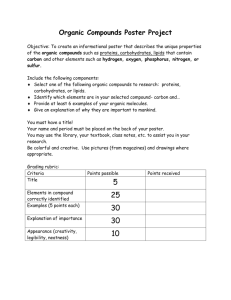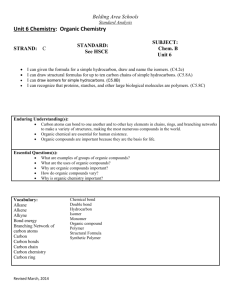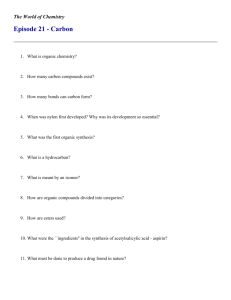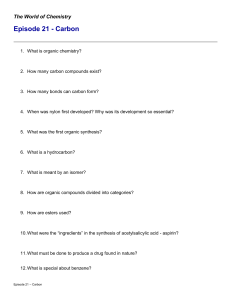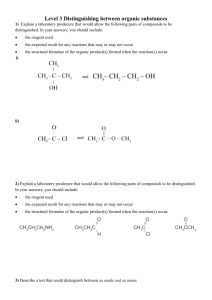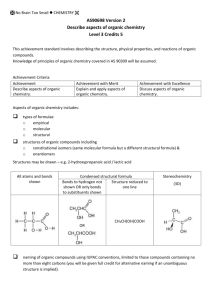91391 Demonstrate understanding of the properties of
advertisement
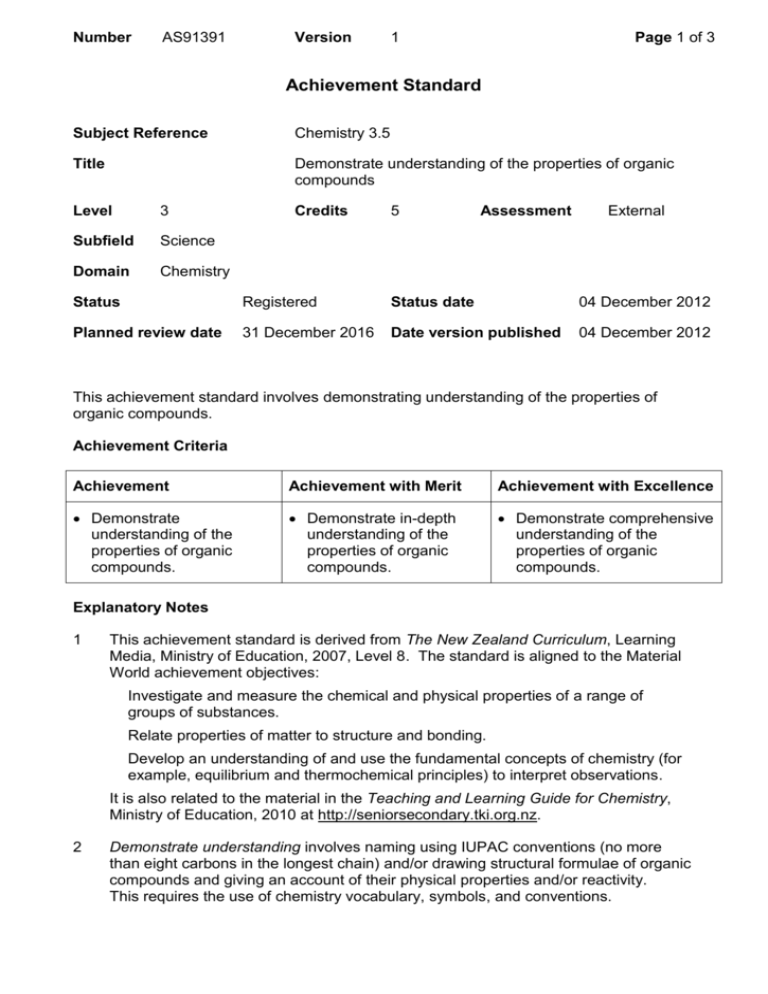
Number AS91391 Version 1 Page 1 of 3 Achievement Standard Subject Reference Chemistry 3.5 Title Demonstrate understanding of the properties of organic compounds Level 3 Subfield Science Domain Chemistry Credits 5 Assessment External Status Registered Status date 04 December 2012 Planned review date 31 December 2016 Date version published 04 December 2012 This achievement standard involves demonstrating understanding of the properties of organic compounds. Achievement Criteria Achievement Achievement with Merit Achievement with Excellence Demonstrate understanding of the properties of organic compounds. Demonstrate in-depth understanding of the properties of organic compounds. Demonstrate comprehensive understanding of the properties of organic compounds. Explanatory Notes 1 This achievement standard is derived from The New Zealand Curriculum, Learning Media, Ministry of Education, 2007, Level 8. The standard is aligned to the Material World achievement objectives: Investigate and measure the chemical and physical properties of a range of groups of substances. Relate properties of matter to structure and bonding. Develop an understanding of and use the fundamental concepts of chemistry (for example, equilibrium and thermochemical principles) to interpret observations. It is also related to the material in the Teaching and Learning Guide for Chemistry, Ministry of Education, 2010 at http://seniorsecondary.tki.org.nz. 2 Demonstrate understanding involves naming using IUPAC conventions (no more than eight carbons in the longest chain) and/or drawing structural formulae of organic compounds and giving an account of their physical properties and/or reactivity. This requires the use of chemistry vocabulary, symbols, and conventions. Number AS91391 Version 1 Page 2 of 3 Demonstrate in-depth understanding involves making and explaining links between structure, functional groups, physical properties, and reactivity of organic compounds. This requires explanations that use chemistry vocabulary, symbols, and conventions. Demonstrate comprehensive understanding involves elaborating, justifying, relating, evaluating or comparing and contrasting the links between the structure, functional groups, physical properties and/or reactivity of organic compounds. This requires the consistent use of chemistry vocabulary, symbols, and conventions. 3 Organic compounds are limited to those containing one or more of the following functional groups: alkene, haloalkane, amine, alcohol, aldehyde, ketone, carboxylic acid, ester (including triglycerides), acyl chloride, and amide. 4 Structure includes functional groups and isomerism (constitutional isomers and stereoisomers). 5 Reactivity of organic compounds is limited to: substitution reactions using the following reagents: concentrated HCl, HBr, SOCl2, NaOH, KOH (in alcohol or aqueous solution), concentrated NH3, primary amines, primary alcohols/H+, H2O/H+, H2O/OH– (Substitution reactions include esterification, condensation, hydrolysis, and polymerisation.) oxidation reactions using the following reagents: MnO4–/H+, Cr2O72–/H+, Tollens’, Fehling’s and Benedict’s. Reduction of aldehydes and ketones with NaBH4 elimination reactions using the following reagents: KOH in alcohol and concentrated H2SO4 (includes major and minor products from asymmetric alcohols and haloalkanes) polymerisation reactions involving formation of polyesters and polyamides including proteins addition reactions of alkenes (used for the identification of the products of elimination reactions). 6 Physical properties of organic compounds may be used to distinguish between organic compounds and are limited to: solubility melting point and boiling point rotation of plane-polarised light. 7 Assessment Specifications for this achievement standard can be accessed through the Chemistry Resources page found at http://www.nzqa.govt.nz/qualificationsstandards/qualifications/ncea/subjects/. Replacement Information This achievement standard replaced unit standard 6344 and AS90698. Number AS91391 Version 1 Page 3 of 3 Quality Assurance 1 Providers and Industry Training Organisations must have been granted consent to assess by NZQA before they can register credits from assessment against achievement standards. 2 Organisations with consent to assess and Industry Training Organisations assessing against achievement standards must engage with the moderation system that applies to those achievement standards. Consent and Moderation Requirements (CMR) reference 0233
